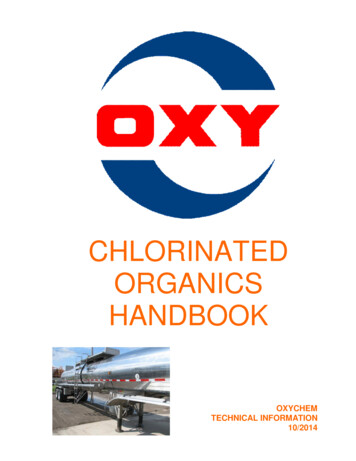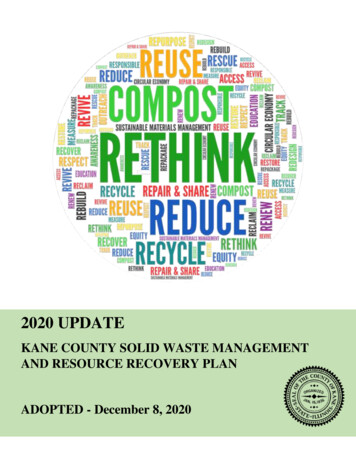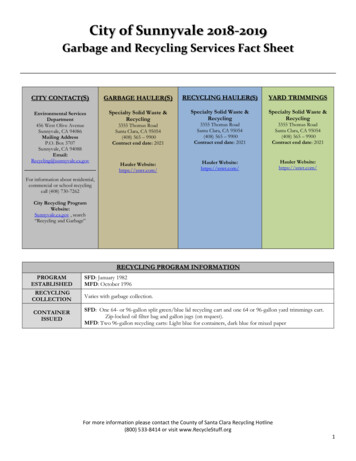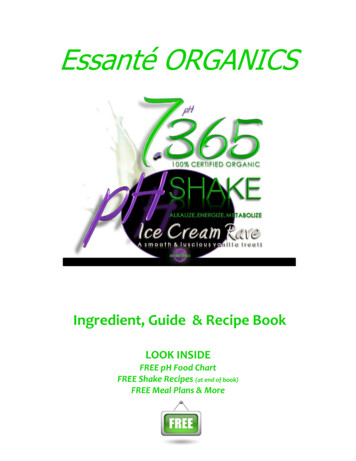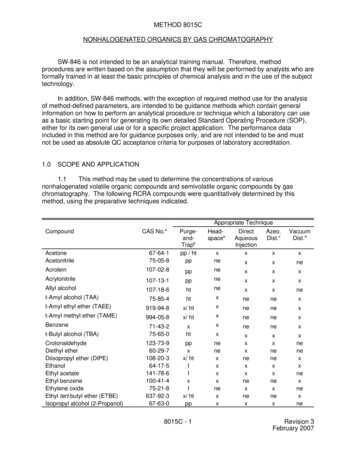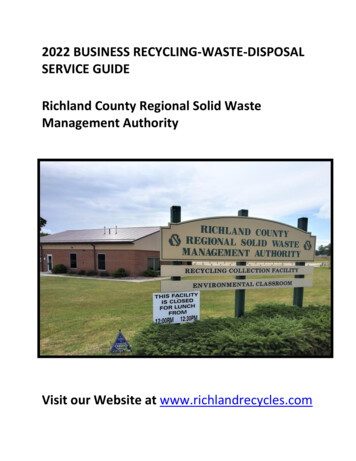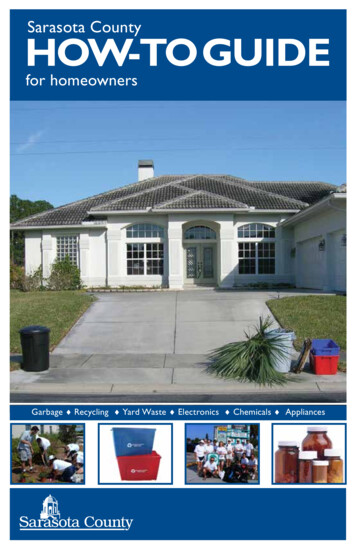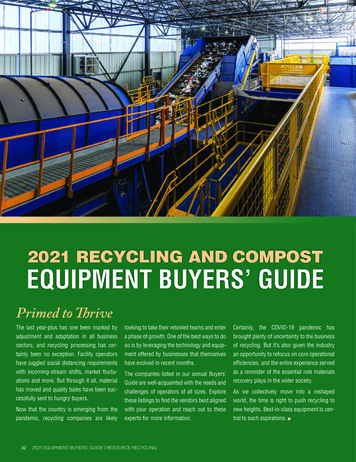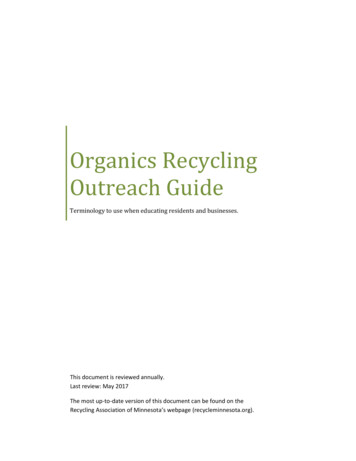
Transcription
Organics RecyclingOutreach GuideTerminology to use when educating residents and businesses.This document is reviewed annually.Last review: May 2017The most up-to-date version of this document can be found on theRecycling Association of Minnesota’s webpage (recycleminnesota.org).
This document is meant to be a guiding document to be used voluntarily by waste educators both publicand private statewide. The subcommittee of the Association of Recycling Managers created thisdocument. The following organizations were represented on the committee at the time of the Guide’screation: Anoka County—Sue DollCarver County—Leslie WilsonCity of Columbia Heights—Jesse DaviesCity of Minneapolis—Kellie KishCity of Shorewood—Julie MooreCity of St. Louis Park—Kala FisherCommunications Team of the Solid Waste Management Coordinating Board— Yeamah Brewer,Jenny Kedward, Alisa Reckinger, Leslie WilsonDakota County—Jenny KedwardHennepin County—John Jaimez, Alisa ReckingerMinnesota Composting Council—Tim Farnan, Kellie KishMinnesota Pollution Control Agency—Tim Farnan, Emily BarkerRamsey County—Jean BuckleyRecycling Association of Minnesota—Maggie MattacolaSET/The Mulch Store—Rob FriendThe document is supported or reviewed by representatives from the following organizations: Association of Recycling ManagersCity of ChamplinCity of HopkinsCity of RosevilleCity of St. Louis ParkCity of West St. PaulCreekSide Soils (Hutchinson)Dakota CountyDakota Roots SMSC Organics Recycling FacilityDakota Valley Recycling (Cities of Apple Valley, Burnsville, Eagan)Full Circle Organics (Good Thunder, St. Cloud, Kasson Facilities accept SSO)Minnesota Composting CouncilSET/The Mulch Store (Rosemount, MN)Solid Waste Management Coordinating Board Communications TeamWestern Lake Superior Sanitary District (Duluth)Organics Recycling Style GuideUpdated May 2017Page 1
Organics Recycling TerminologyGoal: To create a style guide used statewide for printed and verbal communication with consistentterminology, symbols, and color.Program terminologyOverall program term: Organics Recycling Used as the title of a specific program or a title of the document: capitalize both words Used as a general term: lowercase both words If space permits, use Organics Recycling. If space is a limited (e.g. signage) simply use Organics. Avoid using the terms compost/composting Avoid using the term waste/wasted Promotional campaigns may use different tag-line to lead audience to program content/intent.Symbol/Logos: at this time – avoid including a symbol (including the recycling symbol) in associationwith organics recycling) Avoid using the recycling symbol to prevent organics being placed in a recycling cart. Regional team will be evaluating a symbol to use in the future Use the BPI (Biodegradable Products Institute) and/or Cedar Grove logos, when educatingresidents and businesses on compostable products. These agencies certify compostableproducts.UsageThe use of these terms is completely voluntary and is meant for public education. Examples ofeducational materials in which this guide might be used include: Brochures and print materialsWebsite contentOne-on-one education (phone, in person, email)Interviews for print or recorded media eventsVideosPSA (paid or free media – billboards, press releases, etc.)Social MediaMedia campaign (includes one or more from the above)Signage considerationsTitle: Use “Organics for (insert program type here)”For example, Organics for composting, Organics for food to animals, etc.)Organics Recycling Style GuideUpdated May 2017Page 2
ColorUse the following colors for signs and other major documents: CMYK Green 56.0.100.27 PMS 370Organics Recycling Program TypesUse the following terms when explaining a program: Large-scale / industrial compost facility/site Backyard composting Small-scale / community compost site (not backyard) Food to People OR Food Rescue (promote to businesses only) Food to Animals (Regulated through MN Board of Animal Health) Food to Animal Feed (promote to businesses only)For future consideration: Organics for Anaerobic Digestion (wet system) Organics for Anaerobic Digestion (dry system)Layout for detailed descriptionsOutlineWhen describing the program, use sub-category and terms below – modifying for space allotments.Material Category Choices for category titleAcceptable and non-acceptable materials for category Use these terms when explaining what items are or are not accepted in categoryOrganics Recycling Style GuideUpdated May 2017Page 3
Organics Recycling for CompostingLarge-scale / industrial compost facility/siteMaterial Category: Food(choose one or more from below for a title or sub-category): FoodAll FoodFood ScrapsSub-descriptors under Food category include:Check with your facility before using food lists terms in educational materials.AcceptedNot AcceptedMaybe (depends on Produce OR Fruits and vegetableso Peelings, pits and shellsMeat, fish and boneso Bones, scales and shellsDairy productso Yogurt and cheeseEggs and eggshellsBakery and dry goodso Pasta, beans and riceo Bread and cerealo Nuts and shellso DoughPet food(small amounts are accepted)program/facility) Grease or oilChewing gumStickers on produceLiquids**Full Circle Organics can handle larger amounts of liquids. Other facilities cannot.Material Category: Paper (choose one or more from below for a title or sub-category): PaperSoiled paperSoiled paper goodsFood-soiled paperNon-recyclable paper products/goodsSub-descriptors under Paper category include:Check with your facility before using paper lists terms in educational materials.AcceptedNot AcceptedMaybe (depends onprogram/facility) Napkins, paper towels andtissuesPaper egg cartonsShredded paperCertified compostable plates,Organics Recycling Style Guide Paper that can be recycledCartons (milk cartons, juiceboxes, soup, broth and winecartons)Paper products (plates, boats, Pizza boxes fromdelivery**Paper towels and tissuesfrom bathrooms**Updated May 2017Page 4
Large-scale/Industrial Composting (Continued) bowls and containers*Certified compostable cups (hotand cold)*Paper bags (recycle if not soiled)Parchment and wax paper*Tissue paperPaper towel and toilet paper rolls bowls) without BPI or CedarGrove certificationTake-out cups (hot and cold)without BPI or Cedar GrovecertificationRefrigerated and frozen foodboxesFast food wrappersButcher paper/wrapMicrowave popcorn bagsIce cream tubsChinese take-out food containersProducts labeled “biodegradable”Paper coated with foilWax/produce cardboard boxesWrapping paper*Must have BPI or Cedar Grove logo on product or product container.**Western Lake Superior Sanitary District (WLSSD) does not accept these items but Metro Area facilities do.Material Category: Other Compostable/Household Items (choose one or more from below): Other compostable itemsOther household itemsSub-descriptors under Other Compostable/Household Items category include:Check with your facility before using other compostable/household items lists terms in educationalmaterials.AcceptedNot AcceptedMaybe (depends on program/facility) Coffee grounds and filtersTea bagsHouseplant trimmingsWood chopsticks, popsicle sticksand toothpicksCertified-compostable plasticproducts*:o Cups, plates and bowlso Utensils and strawso Bagso ContainersHair and nail clippingsOrganics Recycling Style Guide Recyclable materials (glass,plastic, paper, metal)PlasticAnimal waste and litterDiapers and sanitary productsMicrowave popcorn bagsDryer sheetsDryer lintDental flossCleaning or baby wipesCigarettesFireplace or BBQ ashesCharcoalRocks, soil and dirtLatex products Yard wasteBamboo productsCotton balls and paperswabsAnimal beddingUpdated May 2017Page 5
Large-scale/Industrial Composting (Continued)o Gloves, balloons Vacuum cleaner bags andcontents Black Walnut Shells Products labeled as“biodegradable”*Must have BPI or Cedar Grove logo on product or product container.Backyard Composting & Small-Scale/Community Compost SiteReview local unit of government regulations on backyard composting and small-scale/communitycompost site composting. Information provided below is general for an average backyard composter orsmall-scale /community composter who does some management of their backyard or small-scalecompost pile. People or communities who have larger compost piles and/or more actively manage(water, aerate) their pile can compost a larger variety of materials.Material Category: FoodSub-descriptors under Food category include:AcceptedNot AcceptedMaybe (depends on backyardcomposting skill level) Produce OR Fruits and vegetableso Peelings and shellsBakery and dry goodso Pasta, beans and riceo Bread and cerealPet food Meat, fish and boneso Bones, scales and shellsDairy productso Yogurt and cheeseEggsRaw or cooked food with oil,grease, or dairyFats, oils, or greaseChewing gumStickers on produceLiquidsCooked meat scrapsRinsed eggshellsFruit pitsNuts and shellsDoughMaterial Category: PaperSub-descriptors under Paper category include:AcceptedNot AcceptedMaybe (depends on backyardcomposting skill level) Napkins, paper towels andtissuesPaper egg cartonsShredded paper (no metal orplastic)Paper bags (recycle if not soiled)Tissue paperPaper towel and toilet paper rollsOrganics Recycling Style Guide All “not accepted” items inLarge-Scale/IndustrialComposting Certified compostable plates,bowls and containers*Certified compostable takeout cups*Pizza boxes from deliveryParchment and wax paperUpdated May 2017Page 6
Backyard Composting & Small-Scale/Community Compost Site (Continued) Paper towels and tissues frombathrooms*Must have BPI or Cedar Grove logo on product or product container.Material Category: Yard WasteSub-descriptors under Yard Waste category include:AcceptedNot AcceptedMaybe (depends on backyardcomposting skill level) Leaves Grass clippings Twigs and pineconesWoodchipsHouseplant or garden plants andtrimmingsStrawSawdust (untreated wood only)Treated woodSawdust (treated wood) Weeds gone to seedNoxious weedsDiseased plant materialMaterial Category: Other Compostable/Household ItemsSub-descriptors under Other Compostable/Household Items category include:AcceptedNot AcceptedMaybe (depends on backyardcomposting skill level) Coffee grounds and filtersTea bags (no metal)Cotton balls and paper swabsHair and nail clippings All “not accepted” items inLarge-Scale/IndustrialComposting Bamboo productsWood chopsticks, popsiclesticks and toothpicksCertified-compostableplastic products*:o Cups, plates and bowlso Utensils and strawso Bagso ContainersAnimal bedding*Must have BPI or Cedar Grove logo on product or product container.Organics Recycling Style GuideUpdated May 2017Page 7
Organics for Food to AnimalsLocal companies: Barthold Farms and Second Harvest FarmsMaterial Category: Food (choose one or more from below for a title or sub-category): FoodAll FoodFood ScrapsSub-descriptors under Food category include:Check with your facility before using terms in educational materials.Accepted Produce OR Fruits andvegetableso Peelings, pits and shells Dairy productso Yogurt and cheese Eggs and eggshells Bakery and dry goodso Pasta, beans and riceo Bread and cerealo Nuts and shells Pet foodNot Accepted Non-food items Liquids Grease or oil Gum Animal waste, litter andbedding Plants and yard wasteMaybe (depends on program) Meat, Fish & Boneso Bones, scales and shells Coffee grounds, filters & teabagsOrganics for Food to Animal FeedLocal companies: Endres Processing and ReConserve of MinnesotaMaterial Category: FoodBakery and cereal grain by-products onlyAccepted from industrial bakeries onlyCheck with your facility before using terms in educational materials.AcceptedNot Accepted Bakery and cereal grain by-products Meat, Fish, Bones Produce OR Fruits and vegetables Dairy products Eggs and eggshells Non-food items Liquids Grease or oil Animal waste, litter and bedding Plants and yard wasteOrganics Recycling Style GuideUpdated May 2017Page 8
Organics Recycling Style GuideUpdated May 2017Page 9
Overall program term: Organics Recycling Used as the title of a specific program or a title of the document: capitalize both words Used as a general term: lowercase both words If space permits, use Organics Recycling. If space is a limited (e.g. signage) simply use Organics. Avoid using the terms compost/composting
